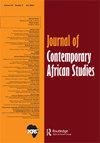Is it yet uhuru? How religious institutions disconnect with the governments in the fight against COVID-19 in Nigeria
IF 0.8
Q2 AREA STUDIES
引用次数: 4
Abstract
ABSTRACT The rise of the deadly corona virus disease (COVID-19) has made governance a daunting task, worsened by the complacency and lack of cooperation from groups as important as religious institutions. This study, unlike previous studies that have focused only on religious groups' resistance to lockdown rules, examined the complacency of religious institutions towards the campaign against COVID-19 in a post-lockdown Nigeria. Data were collected through key informant interviews and personal observations at churches and mosques in Anambra, Ebonyi, Enugu, Kaduna, and Rivers States in Nigeria. Using a descriptive narrative method, it was found that many religious institutions have begun neglecting the government-sponsored COVID-19 safety guidelines in their local gatherings. Reasons for this include the belief that COVID-19 is no longer a threat, suspicion and distrust of the government's management of the virus, the relaxation of government monitoring strategies, and the belief in God's healing and protection. With these findings, I make a case for effective dialogues with religious leaders and the reframing of the campaign against COVID-19 in Nigeria to sustain the involvement of religious institutions.是乌胡鲁吗?在尼日利亚抗击新冠肺炎的斗争中,宗教机构如何与政府脱节
摘要致命的冠状病毒病(新冠肺炎)的兴起使治理成为一项艰巨的任务,而宗教机构等重要团体的自满和缺乏合作使治理更加艰巨。与之前只关注宗教团体对封锁规定的抵抗力的研究不同,这项研究考察了封锁后尼日利亚宗教机构对抗击新冠肺炎运动的自满情绪。数据是通过关键线人访谈和在尼日利亚阿南布拉州、埃博尼州、埃努古州、卡杜纳州和里弗斯州的教堂和清真寺的个人观察收集的。使用描述性叙述方法,发现许多宗教机构在当地集会中开始忽视政府资助的新冠肺炎安全指南。原因包括相信新冠肺炎不再是一种威胁,怀疑和不信任政府对病毒的管理,放松政府的监测策略,以及相信上帝的治愈和保护。有了这些发现,我有理由与宗教领袖进行有效对话,并重新规划尼日利亚抗击新冠肺炎的运动,以维持宗教机构的参与。
本文章由计算机程序翻译,如有差异,请以英文原文为准。
求助全文
约1分钟内获得全文
求助全文
来源期刊

Journal of Contemporary African Studies
AREA STUDIES-
CiteScore
2.20
自引率
0.00%
发文量
18
期刊介绍:
Journal of Contemporary African Studies (JCAS) is an interdisciplinary journal seeking to promote an African-centred scholarly understanding of societies on the continent and their location within the global political economy. Its scope extends across a wide range of social science and humanities disciplines with topics covered including, but not limited to, culture, development, education, environmental questions, gender, government, labour, land, leadership, political economy politics, social movements, sociology of knowledge and welfare. JCAS welcomes contributions reviewing general trends in the academic literature with a specific focus on debates and developments in Africa as part of a broader aim of contributing towards the development of viable communities of African scholarship. The journal publishes original research articles, book reviews, notes from the field, debates, research reports and occasional review essays. It also publishes special issues and welcomes proposals for new topics. JCAS is published four times a year, in January, April, July and October.
 求助内容:
求助内容: 应助结果提醒方式:
应助结果提醒方式:


